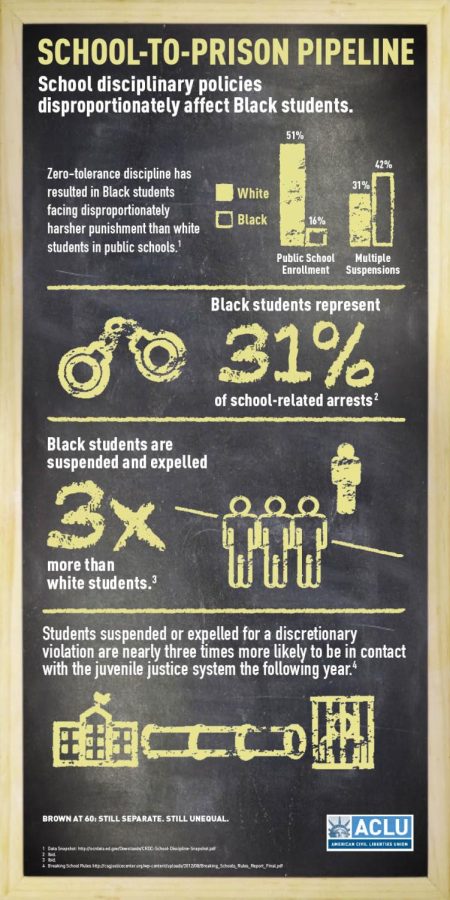Understanding The School to Prison Pipeline
April 24, 2023
The school-to-prison pipeline is a social phenomenon that refers to the disproportionate juvenile incarceration of minorities due to harsh school environments and municipal policies. The largest group affected by this phenomenon are those in low-income neighborhoods. These neighborhoods are susceptible to drug usage and crime. However, instead of attacking these issues from the root causes, lawmakers and police officers resort to physical suppression of the people involved in the crimes. The continual development of unsympathetic policy leads to higher incarceration rates and higher rates of single-parent households. These policies are not only ineffective in solving crime and drug troubles, but they also perpetuate the issues.
Psychology during one’s developmental stages is essential to understanding the school-to-prison pipeline. Humans, particularly in the early stages of life, adapt to their circumstances and environments. Unfortunately, the communities responsible for nurturing young, low-income students have been failed by their state governments and schools. For instance, crime and drug-use appear at significantly higher rates in lower-income communities. This is largely due to the economic insecurity that families face. The youth especially will often look at ways to obtain money quickly which leads them into selling and abusing drugs. Rather than trying to solve the root cause of these community issues, the police and state government have resorted to violence, intolerance, and incarceration. While these methods may stunt the drug issues temporarily, a new wave of young and vulnerable people will fill their place. Thousands of typically minority students are roped into gangs, crime rings, or surrounded by drugs.
The one system that is crucial to correcting this behavior ironically, shows parallels to the impractical state laws. Around the same time municipal policy became sterner, schools started creating more hostile environments and they became more reliant on the police in the form of School Resource Officers. For example, Black and Hispanic students made up a staggering 57% of suspensions from 2009 to 2012 (Education Policy Center 2015) as schools started to adopt stricter suspension requirements. Schools have started to meet minority students with little-to-no compassion when they probably need it the most. The continual lack of accommodation for minority students has led to the students garnering ill feelings toward the school system. These students are then subject to detention, suspension, and even expulsion. These disciplinary actions are more common due to zero-tolerance policies that have increased in popularity among administrations who favor these more convenient but more consequential methods. Additionally, the School Resource Officers (SRO’s) that have been appearing in schools more frequently exacerbate these problems. Schools with SRO’s have as much as eleven times the number of students being sent to juvenile court as to schools without them. This drastically affects the graduation rate and access to college education for minority and low-income students especially. The minority students now have decreased access to proper job opportunities, and they often find themselves resorting to selling drugs or even theft. These initial experiences the youth have with the criminal justice system push them in the direction of crime, addiction, and poverty.
The school-to-prison pipeline is an issue that has yet to been addressed in large by politicians, schools, and the police leaving it still extremely prevalent in schools across the U.S. However, some smaller schools have adopted softening policies to help better fulfill their responsibilities to nurture their students. These small school softening methods hope to be proven correct on a larger scale, but much more work needs to be done before policy like this becomes widespread. Seattle Prep works with programs like the Seattle Clemency Projects that work to reintegrate prisoners into society. The Seattle Clemency Project meets prisoners with compassion and aims to value each prisoner’s story and human dignity. Seniors actively work with the Seattle Clemency Project to restore justice in our communities and carry out our Jesuit mission on a larger scale.




